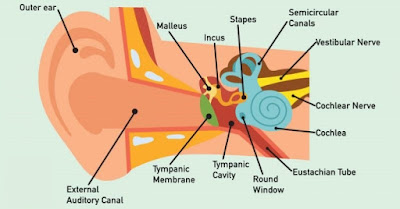- Get link
- X
- Other Apps
- Get link
- X
- Other Apps
You are probably familiar with the nutrients that promote the optimal vision, but were you aware that certain foods benefit your hearing too? If you notice that your hearing is not as it used to be or start feeling you might lose it, your diet might hold the answer.
As a matter of fact, nutritional imbalances are believed to be a significant contributing factor in hearing loss. Age-related is actually not caused by any mechanical dysfunction in the ear, but it is rather how the brain processes the information that leads to reduced hearing.
Nutrients That Protect and Improve Hearing
Here are some of the nutrients that are beneficial for both protecting and improving hearing:
- Magnesium
- Folate
- Zinc
- Carotenoids, especially vitamin A and astaxanthin
- Improving blood flow, which helps reduce cochlear damage associated with compromised vascular system
- Improving homocysteine metabolism
- Protecting against oxidative stress in the cochlea
- Preventing free radical damage
“A 1984 European study reported a 5 to 15 decibel improvement in patients with age-related hearing loss when given vitamins A and E. Other researchers reported that vitamin A deficiency results in a decline in the number of sensory cells in the nose, tongue and inner ear.
A 1993 study reported in Science found that vitamin A can stimulate the regeneration of mammalian auditory hair cells. In 2009, Japanese researchers found that adults with the highest blood serum levels of vitamin A and carotenoids have the lowest risk for hearing loss.
And, in 2014, researchers determined that vitamin A deficiency during pregnancy, especially during the early stages of fetal development ‘may predispose offspring to inner ear malformations and sensorial hearing loss.'”
Folate May Improve Tinnitus
Noise-induced tinnitus, which is manifested by chronic ringing in the ears, can be significantly improved with the consumption of folate ( vitamin B9). This nutrient also lowers homocysteine levels, which have been associated with age-related hearing loss.
Generally, the best way to increase folate levels is by eating lots of fresh, organic leafy green veggies. Folic acid is the synthetic version and is typically found in supplement form.
Zinc for Sudden Hearing Loss
It has been scientifically shown that zinc may be beneficial for idiopathic sudden sensorineural hearing loss (SSNHL) which is typically treated with steroids.
Luckily, 47-63% of those suffering from SSNHL end up recovering their hearing problems caused by viral infection, which explains why zinc appears to be beneficial.
“There was a significant correlation between serum zinc level changes and posttreatment hearing thresholds by correlation analysis, as well as between changes of serum zinc levels and percentage of recovery in the zinc group.
Zinc supplementation may enhance the hearing recovery of SSNHL patients. Its antioxidant and anti-inflammatory effects may help reduce the oxidative stress of the cochlea in SSNHL, implying a new direction in the treatment of this disease.”
A Well-Balanced Diet Is the Best Source of Zinc
Just like with everything else, balance is the key! Excess zinc can be quite problematic, casing a wide range of problems. Among them are:
- Increase the risk of prostate cancer in men15
- Induce nausea, stomach pain, vomiting and diarrhea
- Interfere with your body’s ability to absorb other minerals
The recommended daily allowance (RDA) for zinc is:
- 3 mg for infants
- 5 mg for 4- to 8-year-olds
- 8 mg for 9- to 13-year-olds
- 8 mg for women (If you are lactating or pregnant, you need about 3 mg more)
- 11 milligrams (mg) per day for adult men
- Note: Anything above 50 mg is considered excessive.
A few years ago, a study found that increasing the production of NT3 restored hearing in mice that had been deafened by loud noises.
“This allows researchers to activate genes in particular cells by administering a drug that prompts the cells to ‘read’ additional copies of a gene that have been inserted into them. For this study, the team used the technique to activate additional NT3 genes that had been introduced to the supporting cells of the inner ear in mice that had been partially deafened by loud noise.
The drug tamoxifen was introduced to the supporting cells in the inner ear, which prompted them to produce extra NT3 protein … The researchers found the mice that had experienced boosted NT3 production regained their hearing over a 2-week period, compared with mice that had not had additional NT3 production …
[T]hey now plan to … identify drugs that produce the same effect as the protein, offering the potential to restore hearing loss in humans. The researchers note that the gene therapy technique used in this study has the potential to work in humans, but that a drug-based method would be ‘simpler’ and a drug could be repeatedly administered for as long as it takes for hearing to be restored.”
Health
Health Benefits
Hearing
Home Remedies
Home Treatments
Medicine
Natural Remedies
Natural Treatment
- Get link
- X
- Other Apps
